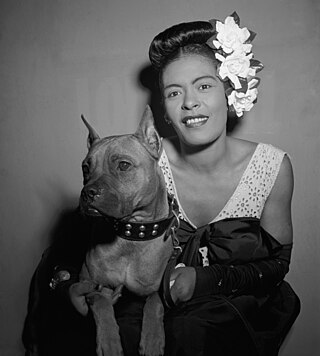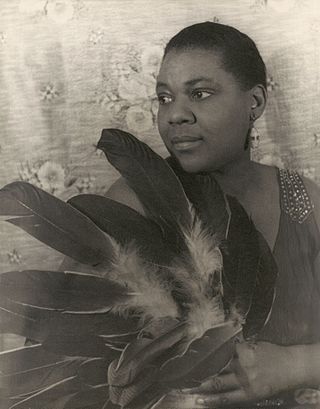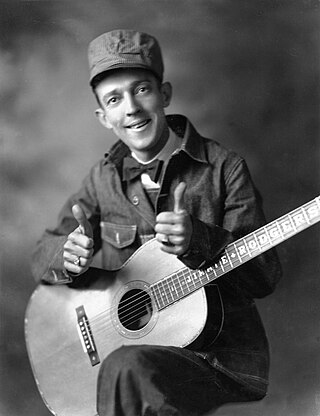Country is a music genre originating in the southern regions of the United States, both the American South and the Southwest. First produced in the 1920s, country music is primarily focused on singing stories about working-class and blue-collar American life.
January 29 is the 29th day of the year in the Gregorian calendar; 336 days remain until the end of the year.

Billie Holiday was an American jazz and swing music singer. Nicknamed "Lady Day" by her friend and music partner, Lester Young, Holiday made a significant contribution to jazz music and pop singing. Her vocal style, strongly influenced by jazz instrumentalists, inspired a new way of manipulating phrasing and tempo. She was known for her vocal delivery and improvisational skills.

Bessie Smith was an African-American blues singer widely renowned during the Jazz Age. Nicknamed the "Empress of the Blues", she was the most popular female blues singer of the 1930s. Inducted into the Rock and Roll Hall of Fame in 1989, she is often regarded as one of the greatest singers of her era and was a major influence on fellow blues singers, as well as jazz vocalists.

Charles Joseph "Buddy" Bolden was an American cornetist who was regarded by contemporaries as a key figure in the development of a New Orleans style of ragtime music, or "jass", which later came to be known as jazz.
Outsider music is music created by self-taught or naïve musicians. The term is usually applied to musicians who have little or no traditional musical experience, who exhibit childlike qualities in their music, or who have intellectual disabilities or mental illnesses. The term was popularized in the 1990s by journalist and WFMU DJ Irwin Chusid.

Authenticity is a concept of personality in the fields of psychology, existential psychotherapy, existentialist philosophy, and aesthetics. In existentialism, authenticity is the degree to which a person's actions are congruent with their values and desires, despite external pressures to social conformity. The conscious self comes to terms with the condition of Geworfenheit, of having been thrown into an absurd world not of their own making, thereby encountering external forces and influences different from and other than the Self. A person’s lack of authenticity is considered bad faith in dealing with other people and with one's self; thus, authenticity is in the instruction of the Oracle of Delphi: “Know thyself.” Concerning authenticity in art, the philosophers Jean Paul Sartre and Theodor Adorno held opposing views and opinions about jazz, a genre of American music; Sartre said that jazz is authentic and Adorno said that jazz is inauthentic. Many musical subcultures require artistic authenticity, lest the community consider an artist to be a poseur for lacking authenticity ; artistic authenticity is integral to many genres of music, including but not limited to genres of rock, club music, and hip-hop.

James Charles Rodgers was an American singer-songwriter and musician who rose to popularity in the late 1920s. Widely regarded as the "Father of Country Music", he is best known for his distinctive yodeling. Rodgers was known as "The Singing Brakeman" and "America's Blue Yodeler". He has been cited as an inspiration by many artists, and he has been inducted into multiple halls of fame.

Ann K. Powers is an American writer and popular music critic. She is a music critic for NPR and a contributor at the Los Angeles Times, where she was previously chief pop critic. She has also written for other publications, such as The New York Times, Blender and The Village Voice. Powers is the author of Weird Like Us: My Bohemian America, a memoir; Good Booty: Love and Sex, Black & White, Body and Soul in American Music, on eroticism in American pop music; and Piece by Piece, co-authored with Tori Amos.
Animals That Swim are a musical group who formed in London, England, 1989, with a line-up of stand-up drums, piano, trumpet and "a nifty line in clever narrative lyrics". In March 2011 they recorded two new songs for online release, originally intended as the first tracks from an as yet untitled album.

"Blue Yodel No. 1 " is a song by American singer-songwriter Jimmie Rodgers. The recording was produced by Ralph Peer, who had originally recorded with Rodgers during the Bristol Sessions. It was released by the Victor Talking Machine Company on February 3, 1928. Rodgers recorded it during his second session with Victor, on November 30, 1927.
Will Friedwald is an American author and music critic. He has written for newspapers that include the Wall Street Journal, New York Times, Village Voice, Newsday, New York Observer, and New York Sun – and for magazines that include Entertainment Weekly, Oxford American, New York, Mojo, BBC Music Magazine, Stereo Review, Fi, and American Heritage.
Bruce Michael Conforth is an American academic, author, lecturer, and musician. He was the first curator of Cleveland's Rock and Roll Hall of Fame.
"Hey Stephen" is a song written and recorded by the American singer-songwriter Taylor Swift for her second studio album, Fearless (2008). It is a country pop and teen pop song about an unrequited love, inspired by a real-life infatuation. Produced by Swift and Nathan Chapman, "Hey Stephen" features drums inspired by girl-group records, an upright bass that propels its groove, and a subdued Hammond B-3 organ. In reviews of Fearless, critics who picked "Hey Stephen" as an album highlight praised what they deemed a catchy melody and earnest lyrics about adolescent feelings. The song peaked at number 94 on the US Billboard Hot 100 and was certified gold by the Recording Industry Association of America (RIAA).

Authenticity in art is manifest in the different ways that a work of art, or an artistic performance, can be considered authentic. The initial distinction is between nominal authenticity and expressive authenticity. In the first sense, nominal authenticity is the correct identification of the author of a work of art; of how closely an actor or an actress interprets a role in a stageplay as written by the playwright; of how well a musician's performance of an artistic composition corresponds to the composer's intention; and how closely an objet d’art conforms to the artistic traditions of its genre. In the second sense, expressive authenticity is how much the work of art possesses inherent authority of and about its subject, and how much of the artist's intent is in the work of art.
Philip John Manning is an Australian blues singer-songwriter and guitarist. Manning has been a member of various groups including Chain and has had a solo career. As a member of Chain, Manning co-wrote their January 1971 single "Black and Blue" which became number one on the Melbourne charts and also Judgement, which reached number two in Sydney. The related album, Toward the Blues followed in September and peaked in the top 10 albums chart.
Alyn Shipton is an English jazz author, presenter, critic, and jazz bassist.

Jon Davison is an American singer, musician and songwriter who has been the lead vocalist of progressive rock band Yes since 2012.
"Moulty" is a song by the American band The Barbarians, and was released in 1966 on Laurie Records. It was written by Doug Morris, Barbara Baer, Eliot Greenberg, and Robert Schwartz, and was also produced by Morris. The lyrics refer to drummer Victor "Moulty" Moulton's loss of his left hand, and the feelings of estrangement that followed. The song was released as a single, and gave The Barbarians their second and final hit on the Billboard Hot 100.
"Dear John" is a song written and recorded by the American singer-songwriter Taylor Swift for her third studio album, Speak Now (2010). The title references the Dear John letter, which is a letter written to a man by his romantic partner to inform him that their relationship is over. The lyrics describe a 19-year-old's toxic and inappropriate relationship with an older man. Produced by Swift and Nathan Chapman, "Dear John" is a slow-burning power ballad combining soft rock, electric blues, and country pop; the production incorporates electric guitar licks.









